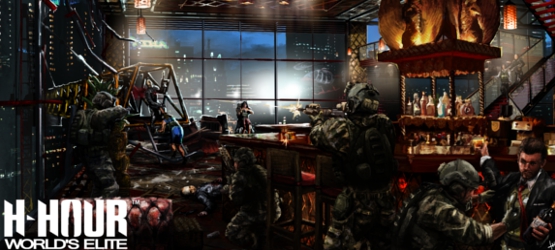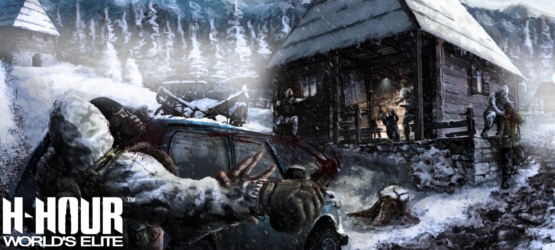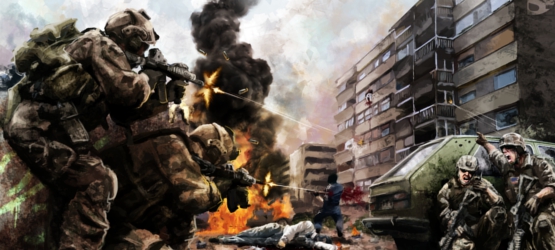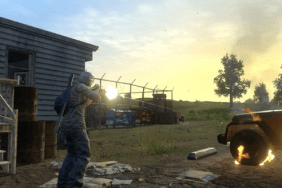
With the shooter genre being heavily geared towards the Call of Duty franchise, will you be implementing any ‘industry standards’ that it has made popular? Such as health regeneration or Killstreaks?
I already weighed in on killstreaks a bit earlier. As for health regeneration, that’s a definite “no.” Our philosophy is that bullets tend to be lethal and no amount of adrenaline surge will prevent you from bleeding out. So a couple or a few hits is enough to take you out of the match. The big benefit in this approach to lethality is that it encourages a somewhat more cautious gameplay because you realize that tactics do matter, that supporting your team does matter. Sure, there are moments where being reckless is fun or even required–just like in real world missions no plan truly survives contact with the enemy. But overall, a simple decision like choosing to not support health regeneration has sweeping consequences in terms of the vibe of the game.
Another feature people ask about a lot is respawn. For ranked matches, we will not be supporting respawn. However, we believe people should be able to play their way as much as possible so you’ll be able to create games in which you can set respawn parameters to your liking. They just won’t be ranked on the central ladder.
Call of Duty has really changed the pace of games to make things more accessible, do you think that this has hurt the market for more hardcore titles similar to SOCOM?
Absolutely, but perhaps not for the reasons many people may think. SOCOM was never designed as a hardcore game. We really tried to make it as accessible as possible and to some extent succeeded relative to that point in time. It only acquired a hardcore reputation after millions and millions of people had been playing it online for a while. It became known as hardcore because players grew very, very skilled at using the mechanics we put in the game. Right now the same effect of “I don’t want to play that game, people are too good” happens in most modern shooters.
Anyway, I think that the trend towards being more accessible really means a trend towards “more stuff.” Not that more stuff is bad, but as more and more publishers chase the leaders in the genre, generating lots more stuff along the way, they are forgetting that there are millions of gamers who don’t want more of that stuff, they want an addictive core experience in which they can see themselves improving every time they play. They want more stuff in the form of maps, game modes, and balanced weapons. Fortunately SOF Studios is in a position to run lean and focus on the core experience, keeping overhead super low. While we would like to sell 17 million copies of the game, we simply don’t need to do that to stay in business, create the game we set out to make, and to make those millions of fans who want this kind of game happy.

You are currently just over half way to your Kickstarter goal of $200k, what are your plans for the project if you are unable to meet that?
Well, on one hand it’s very encouraging to see the enthusiastic response from fans and supporters so far. I think we’re going to make it. On the other hand there’s always the chance that we might not make it. In that case, I can’t predict when H-Hour will be made.
However, the very act of launching a Kickstarter campaign has increased awareness of the project tremendously. There has been a lot of “big pocket” investor interest behind the scenes. If the campaign is successful, we’ll have the proof that people are excited by the game concept and put their money behind it. After that it’s much easier to convince a VC to back the full development of the game.
Are you are developing this as a proof of concept to hopefully spark the interest of more investors, are you looking to self-publish the title, or are you going to be speaking with publishers?
The decision to take H-Hour to Kickstarter was primarily motivated by the need to finish a demo. And the demo has to have those AAA production values I was talking about earlier. Every investor we met with loved the idea of the game, loved the all-star team of developers we’ve lined up, and loved the company’s philosophy. Then after great discussions, they all asked “So when do we get to see the demo?” I suppose that there’s been a shift in what’s required to land funding for a start-up project since the recession started—five years ago it was much easier to secure much more funding than we need–so we have to make a demo to take the project to the next level. And I think it’s less about proof of concept–it’s more “proof of pixels.” People get the idea behind the game, now they just want to see a visually pleasing and fun to play version of it.
Our first choice would definitely be to self-publish if for nothing else to avoid possible creative compromises. We are relying heavily on community input for our design and that alone is a full time commitment. I wouldn’t want to have to add debating with a publisher about game design if we didn’t have to. Having said that there are many excellent potential publishing partners out there whose suggestions about gameplay would be welcome. And publishers can do an amazing job at marketing and PR, among other things. So we’re open to working with the right publisher that understand the vision behind the game. Anyone that wants to put H-Hour in the hands of as many players as possible would be welcome.
What do you think are the benefits and negatives of having to self-publish the title? And what would be the issues of having to go through a publisher instead?
The primary benefit to self-publishing other than creative freedom is the ability to engage with the community directly as much as you would like. We’ve always said that the community would have a strong voice in whatever we do and we’ve been listening to them for a while now. With the launch of the Kickstarter campaign I’ve stepped over a threshold I was never allowed to cross working for large publishers. Our supporters can ask me anything and if there’s not an overriding business reason to not respond, I can. We’re planning to open discussion about key features with the community through moderated forums as well. The experience has been overwhelmingly positive and it’s created a feeling of “doing this together” that I certainly haven’t had before. The big downside to this approach is that there is a very vocal and active community out there and the number of comments and suggestions is tremendous. We have our hands full reading, responding and documenting it all. Still, that’s a great problem to have.
Would you agree to have Sony as a publisher even if it meant that they wanted it to be a PS4 exclusive?
Well, everyone knows I love Sony and I have friends in the company. Speaking entirely for myself, I would love to work with them closely again. However, the premise of our Kickstarter campaign is that we will build both a PC and PS4 version of the game and are open to supporting other platforms if we’re approached to do that. So it’s a big “yes” to Sony if they would allow for the PC version to continue.
How important is it to have H-Hour reach the console market?
I think it’s critical. The original SOCOM fan base were obviously console gamers and the chance to be part of the next PlayStation generation is very appealing to us and to them. At the same time, H-Hour will be a great shooter on PC so we expect to see a lot of supporters on both platforms.
As gamers around the world were sad to see Zipper Interactive close, what were your feelings on the matter? And what were your thoughts on how they handled SOCOM 4?
I still had friends at Zipper when they closed and my heart sank when I heard the news. I have so many fond memories of that place and the people that worked there. They are talented though, and I hoped they would land on their feet. It seems like most have. I was also sad to see at least a temporary “end” to a franchise that I poured myself into for years. But after hearing so many fans of those games ask for more, I decided that now would be a good time to try to create something they would like.
Regarding SOCOM 4’s implementation, I have no comment other than to say I would have done some things differently. That’s because I am a different director and designer, not to point out anything negative about that game. As game developers you make tough choices throughout the production of a game and you can never be sure how people will receive your work until they have received it. Even a perfect game can receive poor reviews or fail to find its market. So I will say that I wish SOCOM 4 had been better received and those guys at Zipper could have kept doing what they loved there.
—
Remember, this project is only set to produce a proof of concept build to get investors interested (at the $200k level), so make sure to read the description completely before donating, but if you were a fan of SOCOM you do not want to miss this opportunity, so help out here.








